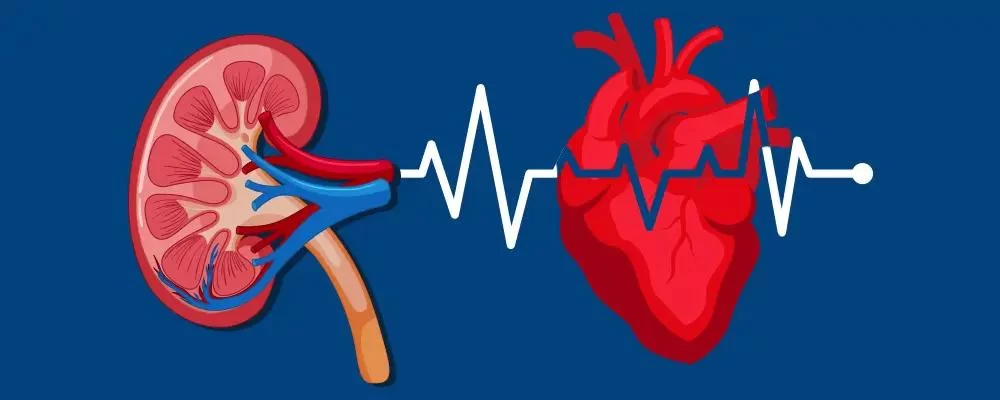The Connection Between Heart Disease and Kidney Disease: Understanding the Relationship
- What Is the Connection Between Heart and Kidney Disease?
- How Heart Disease Affects Kidney Function
- How Kidney Disease Impacts Heart Health
- Managing Both Heart and Kidney Disease Effectively
- Real-Life Examples of Managing Heart and Kidney Health
1. What Is the Connection Between Heart and Kidney Disease?
The connection between heart disease and kidney disease is often referred to as "cardiorenal syndrome." This refers to the bidirectional relationship between the heart and kidneys, where problems in one organ can significantly affect the other. People with heart disease are at a higher risk of developing kidney disease, and vice versa. This is due to the way both organs depend on each other to maintain proper blood flow, fluid balance, and waste elimination.
When the heart is weakened, it can struggle to pump blood efficiently, leading to poor kidney function. Similarly, when the kidneys are not working properly, they can cause fluid buildup, high blood pressure, and other conditions that stress the heart. Understanding this complex connection is vital for individuals with either condition and for healthcare providers in managing both.
2. How Heart Disease Affects Kidney Function
Heart disease, particularly conditions like heart failure, can lead to a reduced blood flow to the kidneys. When the heart is unable to pump effectively, kidneys do not receive enough oxygen and nutrients, leading to impaired kidney function. This condition is known as "cardiorenal syndrome type 1" and is commonly seen in patients with advanced heart failure.
Over time, the lack of proper kidney function can lead to the accumulation of waste products in the body, causing fluid retention and swelling. This can make heart disease worse by increasing the workload on the heart, creating a vicious cycle. Managing heart disease with the help of medications, lifestyle changes, and treatments is essential to prevent kidney damage.
3. How Kidney Disease Impacts Heart Health
Kidney disease also has a profound impact on heart health. When the kidneys are not functioning properly, they cannot filter excess fluid, waste, and salt from the blood. This can lead to an increase in blood pressure, which puts additional strain on the heart. High blood pressure, in turn, is a major risk factor for heart disease and stroke.
Moreover, kidney disease can cause an imbalance in electrolytes, such as potassium and calcium, which can lead to arrhythmias (irregular heartbeats) and further damage to the heart. Patients with chronic kidney disease often have a higher risk of cardiovascular events like heart attacks and strokes, making it essential to manage both kidney and heart health simultaneously.
4. Managing Both Heart and Kidney Disease Effectively
Managing both heart disease and kidney disease requires a comprehensive approach that addresses the interconnected nature of these two organs. Here are some key strategies for managing both conditions:
- Monitor Kidney Function Regularly: Regular blood tests and urine tests are important for monitoring kidney health, especially for those with heart disease. Early detection of kidney problems can prevent further complications.
- Control Blood Pressure: High blood pressure is a major contributor to both heart and kidney disease. Keeping blood pressure under control through medications, diet, and exercise can help protect both the heart and kidneys.
- Dietary Changes: A heart-healthy diet, low in sodium and high in fruits, vegetables, and lean proteins, is crucial for both heart and kidney health. Reducing salt intake helps manage blood pressure and minimizes fluid retention, which can stress both organs.
- Manage Fluid Retention: Fluid buildup is a common problem in both heart and kidney disease. Medications like diuretics can help reduce fluid retention, easing the burden on both the heart and kidneys.
- Stay Active: Physical activity is essential for improving circulation, reducing blood pressure, and strengthening the heart. However, it is important to consult with a healthcare provider to determine the level of activity that is safe for your condition.
5. Real-Life Examples of Managing Heart and Kidney Health
Many individuals with both heart disease and kidney disease have found success in managing both conditions through lifestyle changes and medication. For example, Jane, a 65-year-old woman with heart failure and chronic kidney disease, was able to improve her kidney function and heart health by following a strict diet low in sodium, staying active with daily walking, and carefully managing her blood pressure with prescribed medications. Her doctor closely monitored her kidney function to ensure that her treatment plan was working effectively.
Similarly, Mark, a 72-year-old man with high blood pressure and early-stage kidney disease, successfully prevented further complications by following a heart-healthy diet, taking his prescribed medications, and regularly attending his doctor's appointments. His efforts to manage his blood pressure and kidney health together have helped him maintain a good quality of life.
These stories illustrate the importance of working with healthcare providers to develop a tailored approach to managing both heart and kidney disease. Through proactive care and adherence to a comprehensive treatment plan, individuals with these conditions can live healthier lives.
In conclusion, the connection between heart disease and kidney disease is complex but crucial to understand. By managing both conditions together with the right medical care, lifestyle changes, and regular monitoring, individuals can improve their overall health and quality of life. If you're living with heart or kidney disease, consider discussing treatment options with your healthcare provider to develop an effective management plan tailored to your needs.
If you’re looking for products that can support heart and kidney health, consider heart-healthy supplements or kidney care supplements. Consult with your healthcare provider to find the best products to complement your treatment plan and help you maintain optimal health.





















